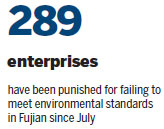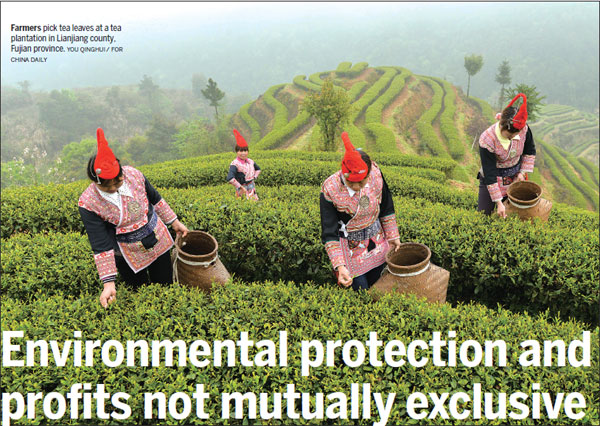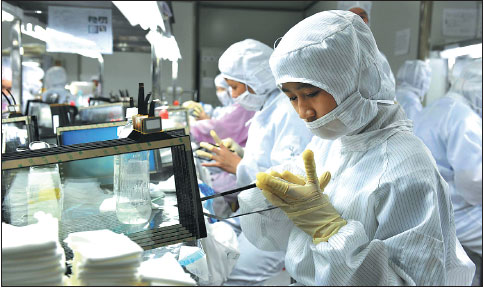Environmental protection and profits not mutually exclusive
Fujian riding economic growth to achieve cleaner water and air
East China's Fujian province has been promoting ecological civilization and transforming its economic growth over the past several decades.
In August, the province was designated a national ecological experimental zone by the central government, the first in the country.
Fujian was selected for its "relatively optimal ecological foundation, and relatively strong environmental resource capacity", according to a guideline released by the general offices of the Communist Party of China Central Committee and the State Council.

Fujian became the country's first ecological civilization demonstration zone in April 2014. President Xi Jinping, then governor of the province, first proposed the goal of building an ecological province in 2000 and added it in his government work report to the annual provincial People's Congress two years later.
Ecological resources are the most precious treasure of Fujian and should be used as the most competitive strength of the province, said Xi, who had worked at several positions in the province for the 17 years prior.
Any form of resource development should be conducted under the precondition of ecological protection so that sustainable social and economic development can be realized, he said.
During the 12th Five-Year Plan period (2011-15), the province planted forests in an area totaling 1.11 million hectares, up 48 percent compared with the previous Five-Year Plan period. About 66 percent of the province is now covered by forest, compared with just 63.1 percent five years ago.
The province's GDP increased by 10.7 percent annually on average during the period, while the number of discharged pollutants decreased for five consecutive years, according to the provincial statistics bureau.
Now, the province's carbon emissions per unit of GDP are only half the national average.
Fujian should abstain from the path of pursuing extensive economic growth at the cost of environment, said You Quan, Party chief of the province.
"Can we call it a quality life if we live in fancy buildings and drive luxury cars while inhaling smog and drinking tainted water?" he asked.
Yu Weiguo, governor of the province, said the government should address prominent issues related to environmental protection, strengthen supervision over pollution and hold not only the violators but also environmental officials accountable for resource depletion or environmental degradation.
Last year, the province launched an environmental protection supervision system, the first of its kind in the country, to address issues relating to pollution control and emissions reduction.
Local officials' performance in supervision over environmental pollution increased from 2 percent to 10 percent in their annual evaluation, according to the system.
Since July, the provincial government has sent environmental inspection teams to Longyan, Quanzhou and Ningde. A total of 289 polluting enterprises were punished, and more than 30 executives of the companies were detained by police.
In Longyan, 17 government officials and employees of State-owned enterprises were held accountable for lax environmental efforts.
By the end of June, Fujian had dealt with 2,096 polluting enterprises and transferred 168 criminal cases to public security authorities after the revised Environmental Protection Law took effect in January last year.
Home to 12 major rivers, Fujian has also set up a water quality protection mechanism to hold deputy governors responsible since 2014. Each of the three deputy governors of the province is named chief in charge of water protection in the regions of the Minjiang, Jiulong and Aojiang rivers.
As a result, the water quality of the 12 rivers in Fujian is on the rise. In the first half of this year, the province's rivers with a water quality rating of Grade III or higher accounted for 95.1 percent of the total, 26.3 percentage points higher than the national average.
China classifies water quality into six levels, ranging from level I, which is suitable for drinking after minimal treatment, to level VI, for water that is severely contaminated.
Anxi county in southeastern Fujian serves as a perfect example of the success of the province's ecological civilization efforts.
The county, which used to be a dusty stone processing base, has become the largest e-commerce industrial center in Fujian.
In 2011, Anxi withdrew from the lucrative but highly pollutive stone processing industry and instead cooperated with Hongqiao Group to build an e-commerce industrial park.
Last year, the park generated an average daily revenue of more than 6 million yuan (about $870,000) and handled more than 100,000 packages every day.
In Nanping, another city in the province, the local government promoted the development of a number of emerging industries, including tourism and biomedicine.
The growth of the government's fiscal revenue has been ranked among the top three in the province for four consecutive years.
Dong Jidong contributed to this story.
humeidong@chinadaily.com.cn
|
Farmers pick tea leaves at a tea plantation in Lianjiang county, Fujian province.You Qinghui / For China Daily |
|
A growing number of companies in Fujian are upgrading their technology and facilities, seeking more eco-friendly growth.You Qinghui / For China Daily |
(China Daily 11/25/2016 page10)














